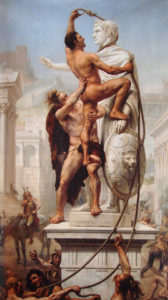410 Visigoths sack Rome
After decades of wandering through the Roman empire looking for a place to settle, battling other barbarians at times, at other times fighting Roman armies, the Visigothic horde under its king Alaric trudged down the Italian peninsula in the summer of 410. The bribes, diplomacy and military force that had kept Alaric at bay were now absent; he had besieged Rome twice before and now that his extortionate demands were being rebuffed by the Emperor Honorius (safe in Ravenna) he meant to take and loot Rome.
By this time, Rome was no longer a politically important city; the capital of the West was in Ravenna, the East was governed from Constantinople. It had been bled dry of its wealth by earlier barbarian threats, but it was still a large and prosperous town that Alaric was intent on plundering. On August 24 his troops entered the city and subjected it to a thorough but not atrocious sack. The Visigoths were by this time Christians (though of the Arian variety, now out of fashion in Rome) and they allowed some churches to be used as sanctuary. Nevertheless, there was the usual murder, rape, pillaging and slave-taking before Alaric called a halt and his forces withdrew.
Rome, in physical terms, would undergo worse treatment by invaders. In 455, the Vandals would launch a much more harmful attack; in 846, 11,000 Arab raiders looted St Peter’s Basilica; in 1527, German troops, many of them Lutherans, sacked Rome in what was probably the most destructive attack the city ever endured. But the psychological effect of the 410 Fall of Rome was enormous. It was, said St Jerome, as if “the whole world had died in one city.” It appalled the ancient world and led many to blame the adoption of Christianity for the destruction. This charge summoned forth St Augustine’s epic The City of God which not only rebutted such accusations but laid forth a Christian scheme for understanding all of history.
In the long run the 410 attack would be overshadowed by the fall of the entire Roman empire in the West. In 476, a barbarian general took the imperial crown from the last emperor and sent the boy home.
